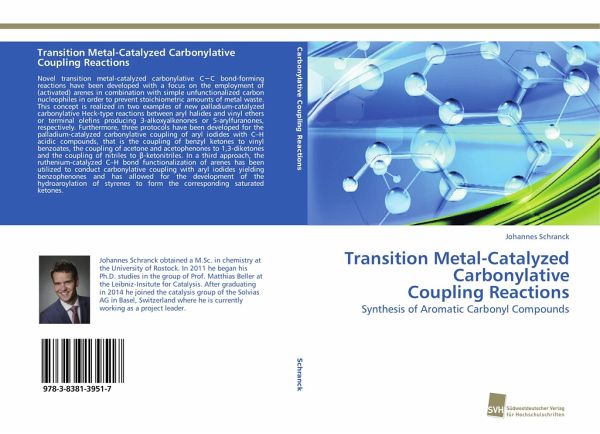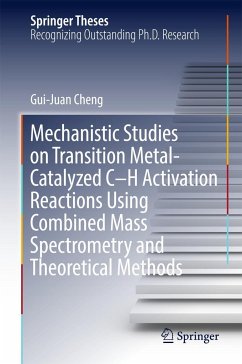
Transition Metal-Catalyzed Carbonylative Coupling Reactions
Synthesis of Aromatic Carbonyl Compounds
Versandkostenfrei!
Versandfertig in 6-10 Tagen
36,99 €
inkl. MwSt.

PAYBACK Punkte
18 °P sammeln!
Novel transition metal-catalyzed carbonylative C C bond-forming reactions have been developed with a focus on the employment of (activated) arenes in combination with simple unfunctionalized carbon nucleophiles in order to prevent stoichiometric amounts of metal waste. This concept is realized in two examples of new palladium-catalyzed carbonylative Heck-type reactions between aryl halides and vinyl ethers or terminal olefins producing 3-alkoxyalkenones or 5-arylfuranones, respectively. Furthermore, three protocols have been developed for the palladium-catalyzed carbonylative coupling of aryl ...
Novel transition metal-catalyzed carbonylative C C bond-forming reactions have been developed with a focus on the employment of (activated) arenes in combination with simple unfunctionalized carbon nucleophiles in order to prevent stoichiometric amounts of metal waste. This concept is realized in two examples of new palladium-catalyzed carbonylative Heck-type reactions between aryl halides and vinyl ethers or terminal olefins producing 3-alkoxyalkenones or 5-arylfuranones, respectively. Furthermore, three protocols have been developed for the palladium-catalyzed carbonylative coupling of aryl iodides with C H acidic compounds, that is the coupling of benzyl ketones to vinyl benzoates, the coupling of acetone and acetophenones to 1,3-diketones and the coupling of nitriles to -ketonitriles. In a third approach, the ruthenium-catalyzed C H bond functionalization of arenes has been utilized to conduct carbonylative coupling with aryl iodides yielding benzophenones and has allowed forthe development of the hydroaroylation of styrenes to form the corresponding saturated ketones.












